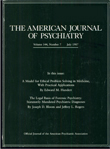Dr. Eisen and Colleagues Reply
TO THE EDITOR: Dr. Werner's letter raises a question about the usefulness of assigning an additional diagnosis of OCD to schizophrenic patients who also have obsessions or compulsions. While a discussion of the relative benefits of a hierarchical nosological system is beyond the scope of this reply, we would like to comment on the difficulties that might arise from Dr. Werner's suggestion to add an obsessive-compulsive symptom modifier to the diagnosis of schizophrenia. There has been much interest recently in ascertaining the frequency with which obsessive-compulsive symptoms co-occur in psychotic disorders such as schizophrenia. It has been suggested that as many as 40% of patients with schizophrenia or schizoaffective disorder have obsessive-compulsive symptoms. Our concern is that using an obsessive-compulsive symptom modifier without clearly defined criteria may lead to nonhomogeneous populations for study (e.g., patients who are overly preoccupied or “obsess” about their delusions or patients who check repeatedly to make sure their phones are not being tapped).
We may have underestimated the frequency of obsessive-compulsive symptoms in the patients with schizophrenia whom we assessed because we required patients to meet the clearly defined DSM-IV criteria for OCD. However, ensuring a homogeneous patient population allows further investigation of important questions such as treatment response, course of illness, and prognosis. Pursuit of these questions may be muddied by the use of an obsessive-compulsive symptom modifier that does not have specific criteria.



